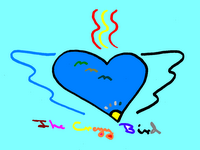
"At the far end of town where the Grickle-grass grows and the wind smells slow-and-sour..."
Thus opens Dr. Seuss' story, "The Lorax" -- of which I first learned just a couple of days ago, because of a chance remark in a blog, sorry, I can't locate where I saw it...
Like so many others, I have always loved Seuss' stories. In my case, the whimsy, the crafted verse, the drawings which matched, but most of all, I loved when the adult mind gave a glimpse of its presence. That is what impressed me with Horton the Elephant:
"I meant what I said and I said what I meant; an elephant's faithful, 100 percent"-- is that, how the story concludes with, "...if things were only like that that, if they were only like that" -- but of course, life is seldom like that.
Anyway, the reason I'm going on about Seuss is that "The Lorax" was banned when it was published in 1971.
That blew my mind -- true, such as my mind is, it doesn't take much to blow it, but still -- Dr. Suess banned?
O yes, it was because it "controversial". The Lorax "speaks for the trees" and the story ends with this horrible bit of propaganda...
Plant a new Truffula. Treat it with care.O well, I suppose that puts Al Gore and his "An Inconvenient Truth" in good company...
Give it clean water. And feed it fresh air.
Grow a forest. Protect it from axes that hack.
Then the Lorax and all of his friends may come back.




No comments:
Post a Comment